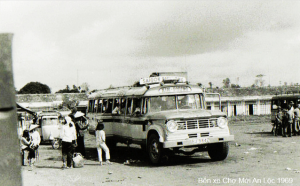 In 1995, having backpacked through Singapore, Thailand, and Laos, I flew from Vientiane to Hanoi and traveled down the coast with Seth. We had many adventures but parted ways in Pleiku. In Saigon I hitched a ride to the Long Distance Bus Station. The trip to An Loc cost sixty cents and took ninety minutes. There were no foreigners, only Vietnamese. Where would I stay? Who and what would I meet? And what of Quan Loi? These were magnetic questions to me.
In 1995, having backpacked through Singapore, Thailand, and Laos, I flew from Vientiane to Hanoi and traveled down the coast with Seth. We had many adventures but parted ways in Pleiku. In Saigon I hitched a ride to the Long Distance Bus Station. The trip to An Loc cost sixty cents and took ninety minutes. There were no foreigners, only Vietnamese. Where would I stay? Who and what would I meet? And what of Quan Loi? These were magnetic questions to me.
When the bus lurched to a grinding halt in An Loc’s neatly tiled center I grabbed my gear  and jumped off. Immediately a crowd gathered about me–a thin, weary tourist. A gaunt, soft-spoken man who later became my guide led me to the tumbldown Binh Long Hotel.
and jumped off. Immediately a crowd gathered about me–a thin, weary tourist. A gaunt, soft-spoken man who later became my guide led me to the tumbldown Binh Long Hotel.
“Here OK,”said Thanh. “Other place expensive.”
Cramped and stuffy, my two dollar a night room had a single hard mattress, torn mosquito netting, and a solitary wood hatched window. At night the heat was unbearable. Mornings, the Binh Long’s communal bathroom was packed with noisy transient Asian men. The Chinese style squat latrines were not pleasant.
The following day Thanh and I rode his battered Honda Cub to Quan Loi. I knew I would find American sand bag bunkers, artillery canons, culvert hooches, the rubber trees which had brought us merciful shade when I first saw combat so many years ago. After a breezy twenty minutes, Thanh pulled over and parked the scooter.
“Why are we stopping?” I asked. My heart dropped when Thanh said, “This is Quan Loi.”
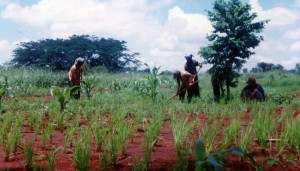 In fact, the huge American base is gone now, flat as a field, the once smooth tarmac airstrip all but crumpled away. The rest of Quan Loi was covered by bush and scrub and its unforgettable red dirt.
In fact, the huge American base is gone now, flat as a field, the once smooth tarmac airstrip all but crumpled away. The rest of Quan Loi was covered by bush and scrub and its unforgettable red dirt.
The heat was unbearable. I poked around,plucked an AK-47 cartridge, rusted and brittle, from the sun baked soil. I took photographs: The remains of the strip, the land where the base once stood; a group of peasants planting corn. The ghosts of their dead filled their faces.
A sad, weather-beaten man wearing a tattered American army shirt who spoke English said he was fifty-five years old; he appeared seventy. He said during the war he had worked with the First Cavalry Division. I asked him if he could locate LZ Compton.
“Yes,” he replied, pointing North,then pulled out his pockets, which were empty and flat, like 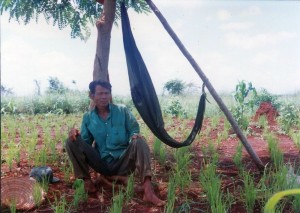 elephant ears. “With Americans I have money and food. I have house. Now I am nothing.”
elephant ears. “With Americans I have money and food. I have house. Now I am nothing.”
I turned aside so he would not see my face, then pressed fifty-thousand dong, two weeks salary, into his hand. A few minutes later I asked a colorfully dressed woman where she lived. After Thanh translated she raised her thin weary arm, pointed due east, and spoke a few words in the beautiful sing song lilt of her language. Thanh said the village was two miles away. I looked about. All the peasants, young and old, wore sandals ground down beyond repair.
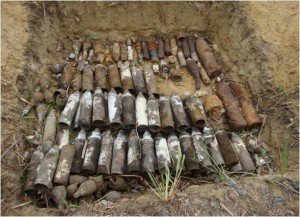 As we walked the area Thanh said at war’s end scavengers and resettled peasants stripped the base clean. Sought after scrap metal was carted away; artillery canons were stolen; homes were built from American timber. For years unexploded ordnance posed a constant danger;only recently has it been cleaned up. Still, he said, beneath the soil Vietnam is littered with old mortar and artillery shells, rotting 40 mm grenades, high explosive five-hundred pound bombs, and Agent Orange. To this day all take their toll on the Vietnamese people.
As we walked the area Thanh said at war’s end scavengers and resettled peasants stripped the base clean. Sought after scrap metal was carted away; artillery canons were stolen; homes were built from American timber. For years unexploded ordnance posed a constant danger;only recently has it been cleaned up. Still, he said, beneath the soil Vietnam is littered with old mortar and artillery shells, rotting 40 mm grenades, high explosive five-hundred pound bombs, and Agent Orange. To this day all take their toll on the Vietnamese people.
It was hot, the noon sun beat straight down. Thanh said he wanted to show me Lake Xosim.* I said goodbye to the peasants, to Quan Loi,and hopped on his scooter.
“I think you will like,” he said.
 The Cub raced forward over the American blacktop. In minutes the hot rushing air dried our sweaty clothes.
The Cub raced forward over the American blacktop. In minutes the hot rushing air dried our sweaty clothes.
The sleepy little village surrounding the lake lay untouched by time. Small neat houses with terra cotta roofs encircled the clear and tranquil waters. Low brambled coffee plants edged the lake perimeter. Exquisite open air pagodas with graceful walkways served as landing docks. I watched a fisherman grip and sway and cast his expanding net.
Two hundred meters out,at the lake’s center, a skeletal bamboo platform stood eerily silent. Thanh pantomimed drinking whiskey. “No one swim here now,” he said. “After holiday,many people drown.” He explained how their spirits haunted the water.
“I want to show you something else,” he said.
We walked a short ways through partially cleared jungle. The remains of an old French fort, built completely of stone, rose up heavy and hypnotic. The laughter of children playing badminton echoed off the moss-covered stones. Thanh looked at me, but I could not speak.
That evening I met Ba, manager at the Binh Long hotel. Short,trim,and pleasant, like Thanh, he too had worked for the Americans. After the war, he said, the NVA had rounded them up, sent them to re-education camps. When I asked what that meant he would not tell me.
Instead, he changed the subject. “What is the English for big machines that push earth?” he asked.
I closed my eyes a moment, scanning a distant landscape. “Bulldozers?”
Ba nodded grimly. “We put bodies in big holes after fighting.”
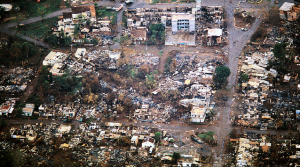 In a soft weary voice he described the ferocious battle that took place in An Loc in 1972. I listened intently. I’d never heard of it before. Ba said thousands of North Vietnamese troops, tanks and artillery, fought a pitched battle against the American backed ARVN. He said American B-52 strikes and attack helicopters pounded the NVA, killed them like animals, but they just kept coming. Than said after seven months of chaos and carnage tens of thousands on both sides had been killed or maimed,the town literally pulverized.
In a soft weary voice he described the ferocious battle that took place in An Loc in 1972. I listened intently. I’d never heard of it before. Ba said thousands of North Vietnamese troops, tanks and artillery, fought a pitched battle against the American backed ARVN. He said American B-52 strikes and attack helicopters pounded the NVA, killed them like animals, but they just kept coming. Than said after seven months of chaos and carnage tens of thousands on both sides had been killed or maimed,the town literally pulverized.
“An Loc still wounded,” he said. “Blood everywhere. Blood you cannot see.”
Late at night on the third day I had unexpected visitors.
“Wake up! Wake up!” said Ba,repeatedly pounding on the wood door. “The police are here. They wish to speak with you.”
“I’m sleeping,” I said. “Tell them ‘go away.’ Tell them I’ll talk tomorrow.”
My travels had taught me not to be intimidated by the authorities. Still, what could they want? On the first day, I handed a copy of my passport (never once giving the real item at any guest house) to the hotel clerk. However, few foreigners visited An Loc, and she had put it aside. Informed of my presence the police tracked me down.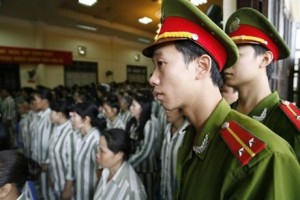
“You come out. You please talk with them,” Ba demanded.
Given the urgent tone in his voice, I quickly dressed and unlocked the door. In the narrow hallway,two thin officers, identical in green caps and green uniforms, pressed a litany of questions.
“Where is your passport? How long you stay? Have you drugs? Have you camera? Where are you travel to An Loc?”
Vietnam remains a secretive culture. Ba ,standing erect, dutifully translated. After ten minutes I agreed to visit police headquarters.
In the dawns sweet cool air Thanh and I drove past thick, impenetrable jungle, past infinite rows of stately rubber trees, at last arriving at a squat one-story building on the town’s outskirts. Inside a damp,musty, ill-lit room,several American carbines hugged a mildewed wall. Their battered wood stocks once embracing gleaming gun metal, were dull and pitted. A policeman pointed to a school child’s chair. For nearly an hour I filled out tissue-thin forms in triplicate.
That afternoon, riding a borrowed bike I returned to the haunting rows of symmetrical rubber, strung my GI hamm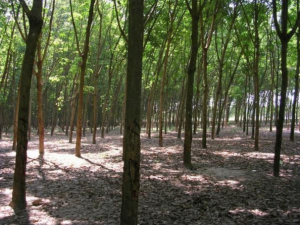 ock between two slender trees and slept while mosquitoes hummed and bit. Waking at dusk, covered with itching welts, I rode back to town and chatted with Thanh and his family.
ock between two slender trees and slept while mosquitoes hummed and bit. Waking at dusk, covered with itching welts, I rode back to town and chatted with Thanh and his family.
Toward 9 PM his lovely wife and young daughter said good night. Into the wee hours, as a light rain tapped on the roof, Thanh and I talked of war and its aftermath. Sometimes we spoke in silence.
The following day, by a sad stroke of luck, I stumbled upon the town hospital. Ba had said that during the battle the ARVN used it as fighting position. He’d said the NVA, holed up in the police station, shelled the hospital with rockets and heavy artillery. I walked the hospital grounds, stared in awe at split-open buildings, the walls pocked by bullets and skittering shrapnel. I drew diagrams,inspected dark, abandoned medical/surgical wards. There were no medical supplies.
A wary female doctor who spoke excellent English said she tried her best to treat her patients. She glanced at a pale unconscious woman on a rusting American gurney.
“Attempted suicide,” she said. “By poison.” Which might have been true.
At night, I heard enormous trucks rumble through town from ten till dawn. Ba said these 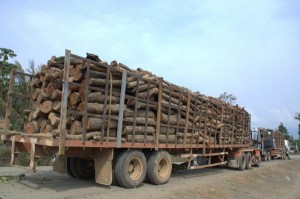 were timber convoys hauling illegal wood from Cambodia. Each trailer lugged fifty immense logs held fast by heavy link chains. Hurried red numbers were chalked over the stiff raw trunks; they could have been bodies.
were timber convoys hauling illegal wood from Cambodia. Each trailer lugged fifty immense logs held fast by heavy link chains. Hurried red numbers were chalked over the stiff raw trunks; they could have been bodies.
Four days later I stood outside the Binh Long Hotel, waiting to leave An Loc. When the bus arrived, Thanh and I embraced. Much was said in those tender moments. I’ve written him several times and received replies,though money I sent went missing.
“First Loc Ninh then Bu Dop,” I said, waving farewell.
It grew dark. A light rain began to fall. But as the bus pulled out I knew I could face what lay ahead.
_____________
Lake Xoxim–the spelling is approximate.
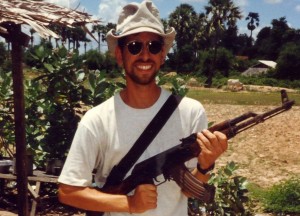
Quan Loi Redux
When the bus lurched to a grinding halt in An Loc’s neatly tiled center I grabbed my gear and jumped off. Immediately a crowd gathered about me–a thin, weary tourist. A gaunt, soft-spoken man who later became my guide led me to the tumbldown Binh Long Hotel.
and jumped off. Immediately a crowd gathered about me–a thin, weary tourist. A gaunt, soft-spoken man who later became my guide led me to the tumbldown Binh Long Hotel.
“Here OK,”said Thanh. “Other place expensive.”
Cramped and stuffy, my two dollar a night room had a single hard mattress, torn mosquito netting, and a solitary wood hatched window. At night the heat was unbearable. Mornings, the Binh Long’s communal bathroom was packed with noisy transient Asian men. The Chinese style squat latrines were not pleasant.
The following day Thanh and I rode his battered Honda Cub to Quan Loi. I knew I would find American sand bag bunkers, artillery canons, culvert hooches, the rubber trees which had brought us merciful shade when I first saw combat so many years ago. After a breezy twenty minutes, Thanh pulled over and parked the scooter.
“Why are we stopping?” I asked. My heart dropped when Thanh said, “This is Quan Loi.”
The heat was unbearable. I poked around,plucked an AK-47 cartridge, rusted and brittle, from the sun baked soil. I took photographs: The remains of the strip, the land where the base once stood; a group of peasants planting corn. The ghosts of their dead filled their faces.
A sad, weather-beaten man wearing a tattered American army shirt who spoke English said he was fifty-five years old; he appeared seventy. He said during the war he had worked with the First Cavalry Division. I asked him if he could locate LZ Compton.
“Yes,” he replied, pointing North,then pulled out his pockets, which were empty and flat, like elephant ears. “With Americans I have money and food. I have house. Now I am nothing.”
elephant ears. “With Americans I have money and food. I have house. Now I am nothing.”
I turned aside so he would not see my face, then pressed fifty-thousand dong, two weeks salary, into his hand. A few minutes later I asked a colorfully dressed woman where she lived. After Thanh translated she raised her thin weary arm, pointed due east, and spoke a few words in the beautiful sing song lilt of her language. Thanh said the village was two miles away. I looked about. All the peasants, young and old, wore sandals ground down beyond repair.
It was hot, the noon sun beat straight down. Thanh said he wanted to show me Lake Xosim.* I said goodbye to the peasants, to Quan Loi,and hopped on his scooter.
“I think you will like,” he said.
The sleepy little village surrounding the lake lay untouched by time. Small neat houses with terra cotta roofs encircled the clear and tranquil waters. Low brambled coffee plants edged the lake perimeter. Exquisite open air pagodas with graceful walkways served as landing docks. I watched a fisherman grip and sway and cast his expanding net.
Two hundred meters out,at the lake’s center, a skeletal bamboo platform stood eerily silent. Thanh pantomimed drinking whiskey. “No one swim here now,” he said. “After holiday,many people drown.” He explained how their spirits haunted the water.
“I want to show you something else,” he said.
We walked a short ways through partially cleared jungle. The remains of an old French fort, built completely of stone, rose up heavy and hypnotic. The laughter of children playing badminton echoed off the moss-covered stones. Thanh looked at me, but I could not speak.
That evening I met Ba, manager at the Binh Long hotel. Short,trim,and pleasant, like Thanh, he too had worked for the Americans. After the war, he said, the NVA had rounded them up, sent them to re-education camps. When I asked what that meant he would not tell me.
Instead, he changed the subject. “What is the English for big machines that push earth?” he asked.
I closed my eyes a moment, scanning a distant landscape. “Bulldozers?”
Ba nodded grimly. “We put bodies in big holes after fighting.”
“An Loc still wounded,” he said. “Blood everywhere. Blood you cannot see.”
Late at night on the third day I had unexpected visitors.
“Wake up! Wake up!” said Ba,repeatedly pounding on the wood door. “The police are here. They wish to speak with you.”
“I’m sleeping,” I said. “Tell them ‘go away.’ Tell them I’ll talk tomorrow.”
My travels had taught me not to be intimidated by the authorities. Still, what could they want? On the first day, I handed a copy of my passport (never once giving the real item at any guest house) to the hotel clerk. However, few foreigners visited An Loc, and she had put it aside. Informed of my presence the police tracked me down.
“You come out. You please talk with them,” Ba demanded.
Given the urgent tone in his voice, I quickly dressed and unlocked the door. In the narrow hallway,two thin officers, identical in green caps and green uniforms, pressed a litany of questions.
“Where is your passport? How long you stay? Have you drugs? Have you camera? Where are you travel to An Loc?”
Vietnam remains a secretive culture. Ba ,standing erect, dutifully translated. After ten minutes I agreed to visit police headquarters.
In the dawns sweet cool air Thanh and I drove past thick, impenetrable jungle, past infinite rows of stately rubber trees, at last arriving at a squat one-story building on the town’s outskirts. Inside a damp,musty, ill-lit room,several American carbines hugged a mildewed wall. Their battered wood stocks once embracing gleaming gun metal, were dull and pitted. A policeman pointed to a school child’s chair. For nearly an hour I filled out tissue-thin forms in triplicate.
That afternoon, riding a borrowed bike I returned to the haunting rows of symmetrical rubber, strung my GI hamm ock between two slender trees and slept while mosquitoes hummed and bit. Waking at dusk, covered with itching welts, I rode back to town and chatted with Thanh and his family.
ock between two slender trees and slept while mosquitoes hummed and bit. Waking at dusk, covered with itching welts, I rode back to town and chatted with Thanh and his family.
Toward 9 PM his lovely wife and young daughter said good night. Into the wee hours, as a light rain tapped on the roof, Thanh and I talked of war and its aftermath. Sometimes we spoke in silence.
The following day, by a sad stroke of luck, I stumbled upon the town hospital. Ba had said that during the battle the ARVN used it as fighting position. He’d said the NVA, holed up in the police station, shelled the hospital with rockets and heavy artillery. I walked the hospital grounds, stared in awe at split-open buildings, the walls pocked by bullets and skittering shrapnel. I drew diagrams,inspected dark, abandoned medical/surgical wards. There were no medical supplies.
A wary female doctor who spoke excellent English said she tried her best to treat her patients. She glanced at a pale unconscious woman on a rusting American gurney.
“Attempted suicide,” she said. “By poison.” Which might have been true.
At night, I heard enormous trucks rumble through town from ten till dawn. Ba said these were timber convoys hauling illegal wood from Cambodia. Each trailer lugged fifty immense logs held fast by heavy link chains. Hurried red numbers were chalked over the stiff raw trunks; they could have been bodies.
were timber convoys hauling illegal wood from Cambodia. Each trailer lugged fifty immense logs held fast by heavy link chains. Hurried red numbers were chalked over the stiff raw trunks; they could have been bodies.
Four days later I stood outside the Binh Long Hotel, waiting to leave An Loc. When the bus arrived, Thanh and I embraced. Much was said in those tender moments. I’ve written him several times and received replies,though money I sent went missing.
“First Loc Ninh then Bu Dop,” I said, waving farewell.
It grew dark. A light rain began to fall. But as the bus pulled out I knew I could face what lay ahead.
_____________
Lake Xoxim–the spelling is approximate.